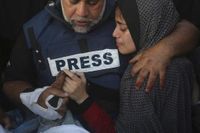On August 25, 2025, the world lost one of its most courageous storytellers. Mariam Dagga, a 33-year-old visual journalist whose lens brought the harrowing realities of the Gaza war to international audiences, was killed by an Israeli strike on Nasser Hospital in Khan Younis, Gaza. Her death, alongside nineteen others—including five journalists—marked a tragic crescendo in what has become the deadliest period for media workers since records began, according to the Committee to Protect Journalists (CPJ).
Dagga’s body of work was a testament to her dedication. Through photographs and video, she documented the daily lives of Palestinians enduring extraordinary adversity: families forced from their homes, crowds clamoring for aid, funerals marked by raw grief, and doctors tending to malnourished or wounded children. As Julie Pace, Executive Editor and Senior Vice President of the Associated Press, put it, "She worked under incredibly difficult circumstances to bring stories from Gaza to the world, particularly coverage of the war’s impact on children." Pace added, "We are devastated by her death and urgently seeking more clarity on the strike."
The strike that killed Dagga was not a random tragedy. According to The New York Times, the Israeli military shelled Nasser Hospital twice in what is known as a double-tap strike—a tactic where an initial attack is quickly followed by a second, often catching first responders and journalists in the crossfire. The Israeli military later claimed it had targeted a Hamas surveillance camera. Prime Minister Benjamin Netanyahu described the incident as a "tragic mishap," promising a military investigation and affirming that Israel values journalists. Yet, the pattern is hard to ignore: at least 200 journalists have died in Gaza since the war began, an overwhelming majority killed by Israeli fire, making this conflict uniquely perilous for the press.
Dagga’s story is emblematic of the risks faced by Palestinian journalists, who have been left to bear witness almost alone. Since the outbreak of the war, Israel has barred international journalists from entering Gaza, citing concerns for their safety. This has left local reporters—nearly all of them Palestinian—to cover the conflict under conditions that outside observers have called both outrageous and self-defeating. As The New York Times editorial board observed, "Israel’s leaders and defenders often argue that they are held to a different standard during wartime from other nations, and they are sometimes correct about that. But the refusal to allow international journalists to cover the war on the ground is an example of the Israeli government’s failing to follow a standard that many other governments, especially democracies, follow."
The policy stands in stark contrast to other modern conflicts. The United States, for example, allowed reporters to cover the wars in Afghanistan and Iraq. Ukraine has permitted journalists to report from its front lines. In Gaza, however, the ban on outside media has forced the world to rely on the work of local journalists like Dagga. The result, ironically, has not been less scrutiny for Israel but more, as social media and first-hand reports have made the devastation impossible to ignore.
The dangers are not limited to the battlefield. Journalists in Gaza face threats from all sides. Hamas, which governs the territory, has also been accused of repressing the free press. As reported by the CPJ, journalist Ibrahim Muhareb was beaten unconscious by men identifying themselves as police investigators, one of whom declared, "The spy and the journalist are one and the same." The future of Gaza, many argue, depends on a press that is free from both Israeli and Hamas interference.
Dagga’s commitment to her work never wavered, even as she was forced to move multiple times during the war. She was among the few women visual journalists covering the conflict, and her reporting on malnourished children won her an internal AP award for outstanding coverage. Her editor at Independent Arabia, Adhwan Alahmari, described her as "among the most ethical, dedicated reporters and photographers," calling the strike that killed her a "flagrant violation of international laws." Sarah El Deeb, an AP reporter based in Beirut, remembered Dagga’s resolve: "Dagga stayed close to Nasser Hospital and was able to see through the cruelty of the war with the skills and patience to report on its cost to the people of Gaza, its doctors, children and mothers."
Her personal life was marked by the same resilience. Born in Khan Younis, Dagga graduated from Al-Aqsa University in Gaza and began her journalism career in 2015. Before the war, she donated a kidney to her father—a gesture her sister, Nada Dagga, recalled with pride. She is survived by her 13-year-old son, who now lives in the United Arab Emirates. When she wasn’t working, she was often on the phone with him. In her will, shared with a friend, she wrote to her son: "Never forget me and remember that your mother did everything she could to make you happy, comfortable, and at ease."
Her funeral, held the same day as her death, was a scene of raw emotion. Relatives and colleagues caressed her cheeks through tears, her body shrouded in white with a single red flower beside her face. Wafaa Shurafa, AP’s senior producer in Gaza, recalled missing a call from Dagga after the first strike hit the hospital. "I was nervous at first because she didn’t answer, I was super worried, I thought she was filming, but I never imagined she was killed," Shurafa said. "She didn’t answer, and she never will again."
The international community has not remained silent. In August 2025, twenty-eight countries—including Britain, France, and Germany—called on Israel to grant immediate media access to Gaza, highlighting the essential role journalists play in exposing the realities of war. Over seventy international media and civil society organizations echoed this demand in a joint letter, asserting, "We fully understand the inherent risks in reporting from war zones." The Israeli government, for its part, has argued that some journalists are affiliated with Hamas or other militant groups, but critics say such claims are often unsupported and used to justify broader restrictions.
The debate over media access in Gaza is not just about press freedom—it is about the right of the world to witness and understand the consequences of war. As the death toll among journalists continues to rise, the urgency for transparency grows ever more acute. The legacy of Mariam Dagga and her colleagues is a stark reminder of the cost of bearing witness, and of the power of images and stories to break through even the most determined efforts at silence.
As Gaza’s war grinds on, the sacrifices of journalists like Dagga ensure that, even in the darkest moments, the world cannot look away.




